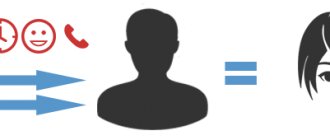“I WAS SURE THAT I HAD MENINGITIS”
– Excessive suspicion about health began in childhood. For most of my life, until I was 16, I lived in the same apartment with my grandmother, who was painfully ill for a long time: first she had a stroke, then another, then cancer. She lay in bed for several years, did not speak, and ceased to be the person I knew her - probably because of this, from an early age, my greatest fear was becoming ill with something incurable. Any minor problem like a sore throat or stomach cramps would send me into a panic.
I can’t say that as a child I was clearly aware of my problem, but I encountered it regularly - for example, I remember taking pills just like that, just in case. Of course, mom and dad responded to my concerns about my well-being: they went with me to doctors, checked for all sorts of diseases. I am the only child in the family, and my parents, in general, paid me enough attention, but what could they do about my suspiciousness? They lived by the principle “if the doctor said everything was fine, then everything was fine.”
When I grew up and began to live alone, I began to take care of my health myself. The situation only got worse - fortunately, there were plenty of medical centers and diagnoses on the Internet.
In fact, the Internet is the main enemy of people like me. An ordinary person will write off banal physical conditions such as dizziness or headaches as fatigue or lack of sleep - but I will start Googling all possible diagnoses, stressing myself out and preparing for the worst options.
For example, I recently started developing otitis media: it seemed like a common illness, but I was alarmed by a headache, and I decided to look up its cause on the Internet. As a result, I, confident that I had meningitis, ran to the ENT specialist for a follow-up appointment. And I calmed down only when they convinced me that I was not dying.
Going to the doctors is a completely separate issue. By the age of 21, it seems that I had already passed all possible examinations and I can say with confidence that eternal trips to different specialists is terrible. Firstly, it’s money, since I usually go to private medical centers. Secondly, I spend a lot of time waiting in line. Thirdly, all these sacrifices don’t really help: it would seem that when they tell you that everything is fine, you should calm down, but it doesn’t last long.
You start to think that you got an incompetent doctor or that you missed something by mistake and overlooked it, but still you soon return to this problem again. And as a result, you become restless, you begin to be afraid of everything and live in constant anxiety.
How to treat a hypochondriac
Film "Formula of Love"
The word heals, conversation drives away thoughts. Talk to the sick!
Film "Major Payne"
A talented boy persistently learns to be upset and complain about life.
Hypochondria has no cure because it is not a disease of the body. Hypochondriacs run to doctors all the time, but doctors are unable to help them: the imaginary disease is incurable.
The first step to healing for any hypochondriac is to realize that the problem is not health. It is especially difficult to do this when, against the background of hypochondria, a person suffers from one really serious disease. But if this step is taken, everything else is easier.
Psychologists are quite effective in combating hypochondria. Cognitive and cognitive behavioral therapy are especially recommended. Its essence is to help a person distinguish true symptoms of a disease from false ones and get rid of disease-causing attitudes, such as: “someone in my family died of cancer, I will certainly die of cancer too,” “I worked in a hazardous industry - I’ve probably already developed radiation sickness,” etc.
The main problem of therapy is that hypochondria rarely walks alone. It is usually associated with some other psychiatric disorder. Most often, hypochondria develops against the background of anxiety disorders.
So far, experts have not given a clear answer as to what comes first and whether hypochondria is a form of anxiety disorder. Psychologists usually have to work with both at the same time. In those rare cases when hypochondria is attached to such serious disorders as hysteria or schizophrenia, these diseases are first dealt with (and, of course, we are definitely talking about the intervention of a psychiatrist, and not just a psychologist).
The question remains, what to do with the “whiners”? Everyone who has had to deal with them for more than one day in a row has their own version of the answer to this question. For the most part, these versions are very inhumane, if not completely illegal...
“Whining” for most of them, on the one hand, is a defensive reaction according to the principle of “pretending to be sick so as not to be touched,” and on the other hand, it is the only way to attract attention to oneself. A good specialist (or often just a close friend) can help them find more productive behavior strategies.
True, there are other whiners for whom whining is part of their image, since in some circles it is fashionable. It is useless to help with this, and it is not necessary.
Hypochondria cannot be cured, but it can be re-educated. It is quite productive to consider hypochondria as a bad habit: at some age a person began to play sick, began to complain about his condition - and if this behavior of his met with the understanding and support of those around him (usually anxious mothers and grandmothers), this behavior of his was consolidated. He became a professional patient, a hypochondriac. Understanding this, we can see a way to cure - by “taking” a person out of the environment where the person is “played along” in his illness, creating negative reinforcements for his painful manifestations, theoretically, it is possible to quickly return the person to the ranks of healthy people.
Theoretically, because in real life such opportunities are very rare. The family prefers to swear at the hypochondriac, but they still feel sorry for him and will not give him up to anyone, and if a person lives alone, then he himself chooses an environment and lifestyle that suits him, allows him to be sick.
“IT TURNS OUT THAT I HAVE BEEN TRYING TO ATTRACT ATTENTION TO MYSELF FROM CHILDHOOD”
At a time when my suspiciousness was especially acute, I came across a definition of hypochondria on the Internet, in which I completely recognized myself. This happened relatively recently - a couple of years ago. And then, when my condition became completely sad, I had to turn to a psychologist - my parents, by the way, contributed greatly to this. There they confirmed to me that I was indeed a hypochondriac and helped me understand the cause of the problem.
According to the specialist, since childhood I tried to attract parental attention with my “illnesses”. Mom really couldn’t devote much time to me because of my grandmother: she looked after her for about ten years. Perhaps this provoked my hypochondria, although it seemed to me that I was never deprived of parental love and attention. However, it was precisely in this regard that my mother and father often did not understand me - they usually simply advised me not to exaggerate the problem and not to overextend myself. They are not at all like me: they may not go to the doctor for several years. But now they laugh that they don’t need it, when their daughter is a walking reference book.
I understand my problem perfectly well, and even I think it’s funny, but it’s already difficult to change my perception: I’ve been reacting this way to any changes in my body for 15 years. So this has already become a habit that I struggle with.
I try to treat this problem with humor, but I still can’t cope with it: you seem to understand that everything is normal and there is no need to think too much, but anxiety forces you to return to the doctors. What if things are serious this time? In general, a vicious circle.
Going to a psychologist still helped - now it’s easier, and I go to doctors much less often. And with the advent of work, there was no time to push yourself too hard. So work is also a kind of therapy.
I hope that one day I will cope with hypochondria. Living in constant anxiety that you have one or another disease is not particularly pleasant, and the time you spend stressing yourself out or sitting in line at the next office can be spent with much greater benefit.
OLEG AIZBERG psychiatrist
How to get rid of hypochondria on your own?
- First, a hypochondriac needs to consult a doctor to make sure that he does not have any imaginary illnesses. Try to take the advice of your family more calmly. Be able to fight the suspicion that relatives only want harm. For treatment, it is best to make an appointment with a psychologist.
- To combat hypochondria, you need to change your lifestyle to a more active one. Busy people have no time to complain or search for non-existent diseases. You can get a dog, cat or other pet. New hobbies or hobbies are good for getting rid of hypochondria. You can do creative work, landscape design, or just any kind of garden work.
- Many hypochondriacs find relief from simple drawing or journaling. Women are calmed and pacified by knitting, embroidery, and creating jewelry. As a result, energy directed at something other than one’s own hypochondriac illness will relieve emotional and internal tension.
- When treating hypochondria, walking, going to fitness clubs or sports, and communicating with people with different interests are helpful. Sometimes a mental disorder can be caused by chronic lack of sleep or excessive physical activity. In this case, good sleep will help greatly.
- During therapy, it is necessary to change the usual daily routine and follow it exactly. Include as many vitamins as possible in your diet. It is necessary to attend exhibitions, theaters and other cultural events. During self-therapy, you need to listen to calm music more often and practice meditation.
Help from family and friends
Relatives and friends should create a calm environment at home. Get rid of all medical literature and try to distract the hypochondriac with other topics all the time. Traditional medicine is very helpful in treating mental disorders. There are many recipes for infusions and decoctions that contain components such as mint, motherwort, hop cones, etc. They have a calming effect. Echinacea makes an excellent tonic decoction. Recipes can be found directly in the herbal instructions (if purchased at the pharmacy). When you collect plants yourself, there are plenty of options for infusions and decoctions on the Internet. But it is desirable that they be found and discharged by their relatives, and not by the hypochondriac himself.
It is best not to take medications without a doctor’s prescription. Otherwise, a hypochondriac can really harm their health. A harmless remedy is motherwort tincture. It should be taken daily, a few drops. The effect does not occur instantly, but after some time. Therefore, motherwort must be drunk daily.
During treatment, the hypochondriac must learn to “talk” to his body. This can be done mentally or in front of a mirror. Set yourself in a positive mood and gradually convince yourself that there are no diseases and your body is healthy. It is not for nothing that they say that thoughts are material. And the body will respond and start the recovery process.
If you have a headache, you just need to lie down and rest. The heart began to beat quickly - the reason may be banal excitement. The hypochondriac must learn to “switch” to abstract topics. But you can’t do self-diagnosis. It is better to direct your energy to helping other people.
Extreme sports help some hypochondriacs cope with the disorder. For example, you can jump with a parachute or ride a roller coaster. The main thing is movement and changing the usual dull lifestyle to a healthy and dynamic one.
Carolina Korableva
About the author: Hello! I am Karolina Korableva. I live in the Moscow region, in the city of Odintsovo. I love life and people. I try to be realistic and optimistic in life. What I value in people is their ability to behave. I am interested in psychology, in particular conflictology. Graduated from RGSU, Faculty of Occupational Psychology and Special Psychology.
WHAT IS HYPOCHONDRIA?
– Fear of illness can occur in various mental disorders. Hypochondriacal disorder is one of them. This is a painful condition in which a person thinks that he has some kind of somatic (physical) disease. He constantly turns to specialists, gets examined and, not being convinced of his suspicions, calms down for a while. Then it seems to him that he was not examined well enough. As a rule, it is examined again, and this can continue for many years.
Another option is somatoform disorders. People suffering from them experience various symptoms: pain in the back, stomach, chest, burning sensation in various parts of the body, palpitations, dizziness and so on. Patients interpret this as a manifestation of a disease and are examined by doctors of various specialties, but no diseases are found that can explain these symptoms.
There is no clear cause for hypochondria and somatoform disorders; they are often caused by high levels of stress and an inability to cope with it. But today this problem is very widespread: the proportion of patients seen by specialists can be up to 30–40%.
As a rule, people over 30 are more likely to experience such disorders. Hypochondria, of course, can occur earlier, but such situations are less common. Children can also periodically complain about unpleasant sensations, but still, as a rule, they do not form the idea that they are sick.
Hypochondria, by the way, also has cultural characteristics: in Asian countries there are more such disorders. In Europe they are less common - there people are more inclined to verbalize their experiences, which helps to avoid unnecessary anxiety. But we are somewhere in the middle.
Who is a hypochondriac?
A hypochondriac is a person who is unshakably confident that he has a serious illness, despite doctors’ assurances to the contrary and the lack of diagnostic confirmation.
Thoughts about this disease haunt him, accompany him everywhere, drive him into depression and cause moral suffering.
The main sign of a hypochondriac is the absolute, 100% falsehood of the diagnosis. Severe forms of this pathology can result in suicide.
All hypochondriacs have a bad character, they become selfish and indifferent to other people's problems. Patients constantly analyze their condition, concentrate on painful sensations, and are absorbed in their emotional experiences.
The calm attitude of others towards their “difficult condition” is perceived as callousness and callousness. This behavior leads to quarrels with loved ones, cooling of relationships, and a decrease in social circle.
Relatives do not know how to communicate with a hypochondriac - he does not listen to anyone, and considers doctors’ arguments to be excuses. In addition, such people, as a rule, are erudite and well-read in medical matters, and are well versed in symptoms and diagnoses. It is impossible to convince them that they are healthy and do not have a serious illness. Hypochondriacs consider malaise and pain to be symptoms of an invented disease and never admit that they are connected with their mental state.
There is no point in scolding such people, because they are sincerely confident in the presence of the described symptoms and serious illnesses. It is impossible to convince a hypochondriac that the disease is far-fetched, even with MRI data and hand tests. This categorical non-perception of the actual state of affairs is the main difference between pathology and increased suspiciousness.
WHY DO FREQUENT EXAMINATIONS LEAD TO ANYTHING?
Taking care of your health is natural and right until it becomes an obsession. The trouble with hypochondriacs is that today there are practically no boundaries for a wide variety of examinations, which means that you can study your condition endlessly. But the fact is that the effectiveness is obvious only in some examinations, in a number of others it has not been strictly proven, and some simply do not make sense.
The situation is aggravated by the fact that now a large number of examinations can be carried out for a fee, without a doctor’s referral - and patients often undergo simply a huge number of unnecessary things.
Plus, during such examinations, doctors sometimes find something that has no danger, but puts patients into panic: small cysts, some developmental features. In theory, specialists who conduct examinations should not explain the results to people, since this is the responsibility of a permanent doctor. And since people come to be examined on their own, they draw their own conclusions, thereby strengthening their hypochondria.
Sometimes it seems that the doctor prescribed this or that examination in vain. But even in this situation, it is difficult to blame specialists: sometimes it is better to prescribe something unnecessary in order to reduce the likelihood of an error, than to overlook and miss.
But when a patient worries excessively and groundlessly about unimportant things, a certain competence is needed to convince him to stop running through all authorities and turn to a psychologist or psychotherapist, and in some cases, a psychiatrist.
Causes of hypochondria
The central reason is the fear of death. But often it is triggered by some traumatic event. The psyche “clings” to it, and obsessive thoughts develop.
Some people begin to suffer from phobias, such as mysophobia (the fear of germs). This is how one psychological state is layered on top of another. But at the core is fear. And you need to work with him.
What kind of event could this be? Everyone has their own.
Let's give one simple example from our practice.
There lived a boy. Until the sixth grade of school everything was fine.
But one day during a biology lesson, the teacher talked about parasites. This is where obsessive thoughts began to arise: “If only not for me. What should I do to prevent this from happening to me?”
It was this event that became traumatic. Then obsessive-compulsive disorder began with him - this is when you perform the same action over and over again and cannot stop.
He started washing his hands 10-20 times and couldn’t stop. It seemed to him that his hands were not clean enough.
Then, having stopped worrying about parasites, he began to worry about microbes. Started avoiding hospitals. Disgust and suspiciousness appeared. So one situation triggers a whole series of relationships that literally poison a person’s life.
There are also deeper reasons.
Usually, before the traumatic event, such a person was already endowed with fears. Most often we deal with fear of parents (be good, otherwise mom will not approve or reject). Clients may have a fear of punishment. Sometimes they are afraid of other people (social phobia), have unstable self-esteem, and are dependent on other people’s opinions.
Therefore, we also deal with parent-child relationships.
WHO SHOULD YOU REALLY TURN TO IF YOU HAVE HYPOCHONDRIA?
In fact, if excessive concern about your health begins to interfere with your quality of life, then you should definitely contact a specialist. As a rule, psychologists and psychotherapists help cope with hypochondria, but in some severe cases - psychiatrists. Psychotherapy mainly helps, but some patients need to take antidepressants.
If you understand that you are close to hypochondria, the surest way to solve the problem is to find a good somatic doctor whom you trust. There will be much more benefit to your health if you do only those examinations that your doctor has prescribed, rather than running around public and private medical institutions and looking for non-existent diseases.
Reproduction of CityDog.by materials is possible only with the written permission of the editors. Details here.









